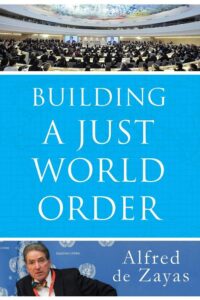 ALFRED DE ZAYAS, alfreddezayas@gmail.com, @AlfreddeZayas
ALFRED DE ZAYAS, alfreddezayas@gmail.com, @AlfreddeZayas
Alfred de Zayas is a law professor at the Geneva School of Diplomacy and served as a UN Independent Expert on International Order 2012-18. He is the author of ten books including Building a Just World Order, 2021.
He said today: “It is obvious that the best solution would have been the implementation of the Minsk agreements, which neither the OSCE [Organization for Security and Co-operation in Europe] nor the Normandy Format succeeded in doing. Russia’s two proposed treaties of December 2021 were moderate and should have been accepted in the name of a peaceful modus vivendi. If Zelensky were a patriot, he would have kept the Ukrainian people out of harm’s way and would have declared Ukraine to be neutral, and on the basis of neutrality it would have had the best relations with East and West. Unfortunately, NATO has a different agenda and its expansion eastwards finds no end. NATO is not at all a defensive alliance — certainly not since the dismantlement of the Warsaw Pact in 1991. But in order to justify its existence, NATO unilaterally declared Russia to be the ‘enemy,’ although Russia was bending over backwards to be integrated into the European and world security architecture. NATO had no place for Russia — except in the role of an ‘enemy’ that would justify the enormous military expenditures demanded from its members.
“Undoubtedly, Russia’s invasion of Ukraine violated article 2(4) of the UN Charter, but there were ‘precedents of permissibility’ established by NATO countries through their aggressive wars against Yugoslavia, Afghanistan, Iraq, Libya and Syria — all with total impunity. Bearing in mind that NATO established these ‘precedents of permissibility,’ it is not surprising that other countries follow suit.” See Zayas’ recent piece, “Precedents of Permissibility.”
He continued: “Among other massive violations of article 2(4) of the UN Charter are Israel’s countless aggressions against its Arab neighbours, the annexation of the Golan Heights, the annexation of East Jerusalem and other Palestine territories, Turkey’s invasion and occupation of Cyprus in 1974 (and fake creation of the Turkish Republic of Northern Cyprus), Saudi Arabia’s on-going merciless war against the people of Yemen, and the September-November 2020 aggression by Azerbaijan against the hapless Armenians of Nagorno Karabakh, who undoubtedly have the right of self-determination. All of these aggressions by NATO members and friends — were conducted with total impunity.
“The United Nations and OSCE have a responsibility for maintaining international peace and security. This requires compromise, not self-righteousness and intransigence. This requires an end to hostilities, arms shipments, threats, and a lifting of sanctions. Only thus can we build a sustainable security architecture for all. More than anything else, we need nuclear disarmament, and a conversion of military-first economies into human-security economies, as I proposed to the UN Human Rights Council in my 2014 report. We must work toward disarmament for development.”